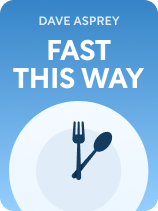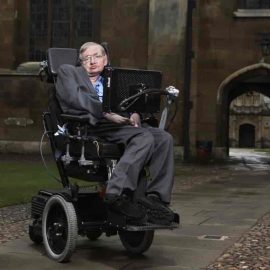

This article is an excerpt from the Shortform book guide to "Fast This Way" by Dave Asprey. Shortform has the world's best summaries and analyses of books you should be reading.
Like this article? Sign up for a free trial here.
What is Dave Asprey’s Fast This Way book about? What does Asprey have to say about intermittent fasting?
In his Fast This Way book, Asprey writes about the benefits of intermittent fasting and how we can improve our health by mimicking the diets of our ancestors. These insights can support major lifestyle changes.
Keep reading to discover why Dave Asprey says intermittent fasting allows you to be your best self.
What Fast This Way Is About
Many people think the primary benefit of intermittent fasting—cycling between periods of eating and not eating—is weight loss. But in his Fast This Way book, Dave Asprey argues it offers far more—and more important—benefits: Fasting transforms you into your best self by optimizing how your mind and body function and helping you gain a sense of control over your life.
Asprey acknowledges that going without food can be challenging, so he’s created an approach to intermittent fasting that reduces its difficulty while making it more enjoyable—“Bulletproof Intermittent Fasting.” By following Asprey’s fasting advice, you can lose weight, think more clearly, and live a longer and healthier life.
Asprey is the founder of Bulletproof, a company selling supplements and other wellness products. He has conducted two decades of research into boosting human performance and is known as the “father of biohacking,” a practice of adjusting your lifestyle and diet to improve mind and body functioning. Asprey also hosts a health and fitness podcast called The Human Upgrade.
In this article, we’ll first explain what intermittent fasting is and how our modern eating habits differ from our bodies’ naturally evolved eating patterns. Then, we’ll discuss the many benefits of fasting, such as its effects on weight loss, physical health, and cognitive health. Lastly, we’ll explore Asprey’s Bulletproof method of fasting and share his tips for successful fasts. Throughout the guide, we’ll supplement Asprey’s insights with those of other health and nutrition experts and provide additional tips to help you in your fasting journey.
What Is Fasting?
Asprey defines fasting as a deliberate choice to abstain from something you feel dependent on. He explains that we all have needs, cravings, and addictions that impact our actions and decisions, causing us anxiety when we’re deprived of them. Fasting helps you break free from these attachments. Throughout this guide, we’ll focus on a specific form of fasting from food called intermittent fasting. However, Asprey adds that you can fast from practically anything—from social media to negativity to video games—and reclaim a sense of power and control in your life.
How Intermittent Fasting Returns Us to Our Natural Way of Eating
Asprey writes that our modern eating habits differ dramatically from our ancestors’. Most of us believe we need food more than we really do, and thus we eat three meals a day—or more. Asprey argues that this pattern of eating isn’t driven by our natural needs but instead is a product of the Industrial Revolution, when people adjusted their eating habits to fit factory and train schedules.
Asprey argues that by intermittent fasting (alternating between specific windows of eating and not eating), you can eat according to your body’s true needs—you’re biologically programmed to get energy from food and then allow your body to rest and heal. Our ancestors used to eat in this way as they regularly cycled between feast and famine depending on the availability of food.
The Benefits of Fasting
According to Asprey, eating the way your body was designed to eat—as intermittent fasting allows you to do—has benefits for your physical health, mental health, and overall strength and fitness. In this section, we’ll look at each of these benefits in more detail.
Fasting Promotes Weight Loss
Asprey writes that fasting helps you lose weight by switching your body’s energy source from glucose to fat. When you fast, your body runs out of glucose from food, so it starts burning fat instead. It converts your fat into energy molecules called ketones, which also suppress your hunger. When your body burns fat as its primary energy source, you’re in a state called ketosis.
(Shortform note: When you stop consuming glucose, it takes some time before your body starts burning fat as its primary fuel source. In The Obesity Code, Jason Fung says ketosis kicks in after two to three days of fasting.)
Asprey argues that, unlike fasting, dieting is ineffective because it relies on the flawed concept of calories-in-calories-out (CICO). This concept asserts that you can lose weight by simply eating fewer calories than you burn. Asprey argues that dieting and CICO are ineffective for health and weight loss for two reasons:
1. Your eating habits affect your weight. Asprey argues that CICO oversimplifies food’s impact on our bodies by focusing solely on calorie count and ignoring the sources of these calories. He writes that factors such as your food choices and meal timings also significantly impact your weight and overall well-being.
2. Your body adjusts your hunger levels to maintain your weight. Each person has a set-point weight that determines how much hunger they experience and how full they feel after eating. This means that even if you manage to trim 50 pounds by dieting, you will still feel as hungry as someone who is 50 pounds heavier. This is why restricting calories isn’t sustainable in the long run. Fasting, on the other hand, helps you reset your set-point weight by reducing your appetite.
Fasting Improves Your Physical Health
Apart from promoting weight loss, fasting also helps your body function more cleanly and optimally. Asprey describes several ways fasting improves your physical health:
1. Fasting triggers autophagy. This is your body’s natural way of cleansing itself by getting rid of toxins and damaged cell parts. This helps your body function more effectively, slows aging, and reduces inflammation, which is your body’s response to illness or injury. Asprey explains that while inflammation helps heal an acute problem (like an ankle sprain), it can be harmful if the response lasts too long. He argues that many modern foods contain harmful toxins that keep your body in a constant state of inflammation. Fasting and autophagy help you clear out those toxins and soothe your inflammation.
2. Fasting balances your insulin levels. When you eat, your body turns food into glucose that your cells can use for energy and releases a hormone called insulin to help your cells absorb the glucose. However, eating too much processed food overloads your body with more glucose than it can use, which can make your cells less responsive to insulin (a condition called insulin resistance, which can result in type 2 diabetes). By depriving your body of calories when you fast, you make your body use its stored sugar and fat instead. This stabilizes your glucose levels and lowers your insulin production, which keeps your cells sensitive to insulin.
Fasting Elevates Your Cognitive Functioning
According to Asprey, fasting has two important benefits for your brain—it helps it function better and it improves your mental health:
1. Fasting enhances your focus, memory, and learning. When you fast, your senses become sharper. This is because evolutionarily, when in a fasted state, our ancestors needed heightened focus to find food. Fasting also helps you think more clearly by reducing inflammation in the brain, clearing out toxins in your bloodstream, and directing energy your body normally uses for digestion to your brain instead.
2. Fasting lifts your mood. During a fast, your body produces chemicals such as dopamine and adrenaline that enhance your mood and energy. These chemicals allowed our ancestors to survive: They gave them energy when they were hungry and helped them stay motivated to hunt for food.
Fasting Enhances Your Workouts
Another benefit of fasting is that it enhances your workouts by making your body more metabolically flexible and resilient. Asprey explains that normally when you work out, your body first turns to carbohydrates—derived from food—for energy. When you fast, however, you don’t have a supply of carbohydrates to use as fuel, so your body burns fat instead. This has two advantages for your workouts: First, fats provide more energy than carbohydrates. Second, fats are anti-inflammatory, so they speed up your muscle healing with less ache and soreness.
(Shortform note: Working out while in ketosis can not only help you burn more fat and recover post-workout, but it can also improve your body composition by optimizing your hormones: In particular, fasting while sprint-training raises human growth hormone (HGH) production and insulin sensitivity, which gives you a more youthful and lean body. However, experts caution that your performance may dip at first until your body gets used to burning fat and not carbohydrates for fuel. It could take up to six months before you become metabolically flexible and have adapted to using fat as a fuel source.)
Fasting Improves Sleep
Asprey writes that fasting can improve the quality of your sleep, which can have a number of benefits for your health: Sleep reduces stress and inflammation, accelerates healing, increases your sex drive, helps with weight loss, and improves your memory and thinking.
According to Asprey, improper eating habits can interfere with your body’s sleep patterns. If you eat close to your bedtime, your stomach will signal to your body that it’s still time to be awake, and you’ll have trouble sleeping soundly. This is not only because your digestive tract is actively consuming energy but also because your blood sugar and insulin levels are increasing, which can cause you to awaken during the night.
Asprey recommends that you stop eating at least three hours before going to bed. He writes that this gap of time allows for enough digestion that your blood sugar won’t be overly elevated as you settle down for the night.
Tips for Intermittent Fasting
Now that we’ve discussed the many benefits of fasting, we’ll look at how you can start intermittent fasting. According to Asprey, one of the biggest obstacles people face when they start to fast is the psychological struggle of going without food. However, he argues that fasting doesn’t have to be a struggle. It can actually be enjoyable and easy—the secret is learning how to avoid hunger pangs. To do this, Asprey presents a simple and effective way to keep hunger pangs at bay while you fast: In the morning, drink a special blend of coffee, grass-fed butter, and a teaspoon or two of C8 MCT oil.
Asprey calls this blend Bulletproof Coffee, and he maintains that the combination of these ingredients allows you to enjoy all the benefits of fasting without feeling hungry.
Decide Which Type of Fasting Works for You
According to Asprey, there are different intermittent fasting windows you can try, each with its unique health benefits. If you’re new to fasting, Asprey recommends you start with the 16:8 Bulletproof intermittent fast. This involves fasting for 16 hours and eating during an eight-hour window, with the addition of Bulletproof Coffee. For example, after a night’s sleep, you could drink a cup of Bulletproof Coffee in the morning, eat lunch at noon (or later), eat dinner, and stop eating at around 8:00 p.m.
Other types of intermittent fasting include:
- The 5:2 fast: Eating normally for five days of the week and eating 500 to 600 calories on the other two days.
- One Meal a Day (OMAD): Fasting for 23 hours and only eating in a one-hour window.
- Alternate-day fast: Fasting every other day.
- Multi-day fasts: Fasting for four to five days or even longer—typically for people who are more experienced with fasting.
Embrace Inconsistency to Become Resilient
Asprey suggests you switch up your fasting routines and avoid sticking to a single variation. This will make your body more flexible and adaptive, and will give you better results. In addition, it will prevent possible problems from arising—Asprey notes that some of the extreme fasts (like OMAD or multi-day fasts) can cause health problems if you do them all the time. Thus, experiment with different fasting windows and sometimes take breaks from fasting altogether.
Take Supplements to Upgrade Your Fast
Asprey suggests you take supplements while fasting to provide your body with the nutrients it needs. He explains that modern foods aren’t as healthful as those our ancestors ate, and we therefore can’t rely on food alone to meet our nutritional needs: Today’s foods contain toxins, chemicals, and stressors that weren’t present years ago, and they contain more calories and fewer nutrients.
(Shortform note: Although it’s true that the nutritional content and toxin levels of individual foods may have changed since ancient times, some argue that a bigger shift, that’s had a more significant effect on modern nutrition, is the change in the breadth of foods we eat today as compared to our ancestors. Ancient foragers ate a wide variety of foods from diverse sources (the mummified body of an Iron Age man, for example, revealed his last meal of porridge consisted of 40 different grains and seeds). Today, agricultural practices have narrowed our food choices down to a handful of staples (sugar, corn, wheat, and rice) and eliminated much variety within vegetables and fruits, resulting in a more limited range of nutrients available to us.)
Asprey recommends several supplements in particular that can provide you with nutritional support and improve your fasting results:
1. Activated charcoal: This type of charcoal traps toxins in your gut and prevents your body from absorbing them. It can help you avoid gut pain while fasting, and it also reduces your hunger cravings.
(Shortform note: Activated charcoal is more commonly used as an emergency treatment for poisoning under medical supervision. However, there isn’t much research to support the efficacy of activated charcoal for your gut health. While mostly safe, activated charcoal can cause side effects like vomiting, diarrhea, constipation, black stools, and sometimes intestinal blockages.)
2. Proteolytic enzymes: These enzymes improve your body’s autophagy process, helping clear out unwanted proteins and other cellular debris. They also improve digestion and blood flow.
(Shortform note: While Asprey suggests you get proteolytic enzymes from supplements, they’re also naturally found in foods such as papaya, pineapple, kiwi, and fermented foods. Supplements are more likely to cause side effects (which include diarrhea, nausea, and vomiting), so some experts suggest consulting your medical provider before taking them.)
3. Adaptogens: These are herbs (such as ashwagandha and ginseng), mushrooms, and other substances that can make your fasts less painful by reducing your stress response and helping you relax.
(Shortform note: For a plant or mushroom to be an adaptogen, it must satisfy three requirements: It must be non-toxic in normal doses, help your body manage stress, and help your body return to homeostasis (an internally balanced state). However, like other vitamins and supplements, adaptogens aren’t regulated by the FDA, so you should research products carefully.)
Be More Mindful if Fasting as a Woman
According to Asprey, women shouldn’t do intermittent fasting every day, but instead, every other day. He explains that fasting affects men and women differently. Women’s bodies are designed to support reproduction and tend to be more sensitive to dietary changes because a lack of food or nutrients could endanger a potential child. Fasting too much or too often can trigger a stress response more quickly than in men and can be harmful to their health. Thus, Asprey recommends that women be attentive to their bodies and adjust their fasting frequency, duration, and intensity according to their individual needs.
(Shortform note: Other experts echo Asprey’s suggestion to be more thoughtful about your approach to fasting if you’re a woman, adding that fasting can cause female sex hormones (estrogen and progesterone) to drop, which can cause headaches, moodiness, changes in your menstrual cycle, and other symptoms. They suggest you start slow with a milder 12-hour fast and gradually work up to a 16-hour fast if you feel OK. They also recommend you avoid fasting a week before your period, which is when your body is more sensitive to stress.)
Exercise: Plan for Your Next Intermittent Fast
According to Asprey, if you follow the right approach, intermittent fasting can be an enjoyable experience that can provide you with a host of benefits. In this exercise, reflect on your goals and plan for a successful fast.
- Reflect on your current eating habits and how they make you feel. How much of it is dictated by societal norms (like eating three meals a day) as opposed to your body’s
- Why are you interested in intermittent fasting? Identify which of the benefits of intermittent fasting you want to enjoy—for example, you might want to manage your weight, improve your mood and thinking, feel better physically, or enhance your workouts.
- Think about the different types of intermittent fasting (such as the 16:8 Bulletproof Intermittent Fast, 5:2 fast, or OMAD). Based on your lifestyle and experience with fasting, which type of intermittent fasting sounds most suitable for you?
- What are one or two of Asprey’s fasting tips (like embracing inconsistency or taking supplements) that you can follow to support your fasts? How do you plan on implementing them?

———End of Preview———
Like what you just read? Read the rest of the world's best book summary and analysis of Dave Asprey's "Fast This Way" at Shortform.
Here's what you'll find in our full Fast This Way summary:
- Why intermittent fasting is more than just a way to lose weight
- How our modern eating habits differ from our bodies' natural eating patterns
- An intermittent fasting method that makes it easier and more enjoyable






